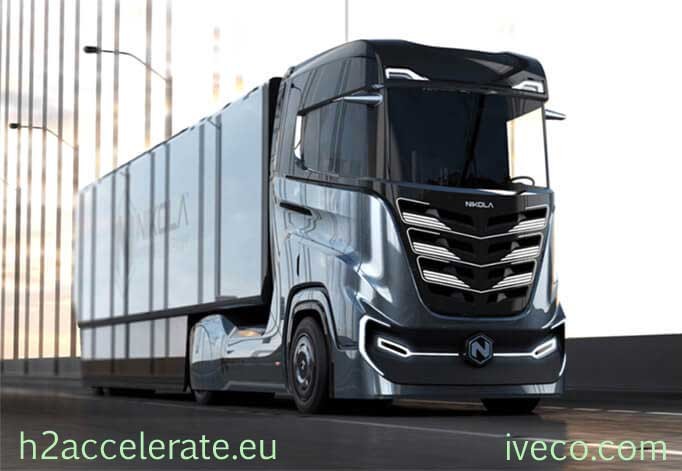Large-scale introduction of hydrogen trucks is only possible by taxing diesel trucks more heavily. H2 trucks are much more expensive than diesel trucks, even in mass production, according to manufacturers.
The large-scale introduction of hydrogen (H2) as a fuel requires government measures. Hydrogen trucks will be much more expensive than diesel trucks, even if they are produced in large numbers.
This is what future suppliers of hydrogen and hydrogen trucks say in a recently published report. They also have a solution for this: diesel must become more expensive through taxation, and toll roads (or road pricing) must become more expensive for diesel vehicles. The manufacturers involved are Volvo Trucks, Daimler and Iveco, and the gas suppliers Linde, Total Energies, Shell and OMV. They are working together in the H2Accelerate stimulus project.
It is surprising to see that an H2 truck will indeed fall in price in the coming years, but will remain one and a half to two and a half times more expensive than a diesel truck, even in large-scale production.
For large-scale implementation, manufacturers distinguish four phases: Research & Development & Deployment (RDD). Industrial Scale Up (ISU), Sustainable Growth (SG) and Full Industrialisation (FI). If you look at the purchase costs of the truck (in this case a motor vehicle), these are stable around 93,000 – 96,000 euros for a diesel truck. A fuel cell truck, on the other hand, costs between 471,000 and 597,000 euros in the current phase (RDD). An astronomical amount. As soon as production starts, this quickly drops (in the SG phase between 182,000 and 247,000 euros), but even with mass production (FI phase) the price of the H2 truck comes to 148,000 to 242,000 euros.
With a tractor-trailer combination, we see similarly enormous price differences. Around 2030-2035, a combination with diesel drive is expected to cost a stable 102,000 to 107,000 euros, while the purchase price of the same set in H2 version should be 177,000 to 295,000 euros.
Is there perhaps a financial gain to be made in fuel consumption? Difficult. According to the manufacturers’ estimates, an H2 truck will consume around 0.07 kilos of hydrogen per km. The price of a kg of H2 (currently around EUR 7.30) will probably drop to around 4.80 per kilo in the next thirteen years, while diesel will remain around 1.37 euros per liter. If you do the math, the fuel costs for both types of trucks appear to be very similar. It is also clear that this report has not yet taken into account the recent major price increase of diesel.
Is there anything to say about the lifespan and residual value of the truck? Although there are only a few examples on the road, estimates have already been made. After five to eight years, a hydrogen truck needs to be replaced (diesel: 5 years) with a residual value of 0 to 20% of the purchase price (diesel truck: 0 to 30%).
All in all, this results in a much higher Cost-of-Ownership for a hydrogen truck; in the H2Accelerate schemes, an estimate of approximately 80 cents per km is given for mass production, with the diesel truck scoring around 60 cents. Conclusion: large-scale introduction is only possible with government measures.
As a necessary measure, the companies suggest the following:
- a CO2 tax on diesel, which can increase annually
- 75% discount on toll roads for hydrogen trucks
- subsidy on the purchase in the initial phase of production
- operational benefits for owners of H2 trucks, such as emission-free zones
or in the extreme case a ban on the use of diesel trucksIn any case, the report makes it clear that the introduction of H2 as a fuel will not be a party for carriers and shippers: the costs will increase significantly in any case. Also for the consumer, because the products in the shops will also become more expensive. But from an environmental point of view it seems inevitable.





